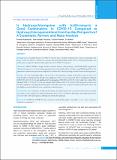Please use this identifier to cite or link to this item:
https://hdl.handle.net/20.500.14356/1025| Title: | Is Hydroxychloroquine with Azithromycin a Good Combination in COVID-19 Compared to Hydroxychloroquine Alone from Cardiac Perspective? A Systematic Review and Meta-Analysis |
| Authors: | Budhathoki, Pravash Shrestha, Dhan Bahadur Khadka, Sitaram Rawal, Era |
| Citation: | BudhathokiP., ShresthaD. B., KhadkaS., & RawalE. (2021). Is Hydroxychloroquine with Azithromycin a Good Combination in COVID-19 Compared to Hydroxychloroquine Alone from Cardiac Perspective? A Systematic Review and Meta-Analysis. Journal of Nepal Health Research Council, 19(1), 1-9. https://doi.org/10.33314/jnhrc.v19i1.3270 |
| Issue Date: | 2021 |
| Publisher: | Nepal Health Research Council |
| Article Type: | Review Article |
| Keywords: | COVID-19 COVID-19 drug treatment Hydroxychloroquine Macrolides Severe acute respiratory syndrome coronavirus 2 |
| Series/Report no.: | Jan-March, 2021;3270 |
| Abstract: | Abstract Background: The global spread of COVID-19 and the lack of definite treatment have caused an alarming crisis in the world. We aimed to evaluate the outcome and potential harmful cardiac effects of hydroxychloroquine and azithromycin compared to hydroxychloroquine alone for COVID-19 treatment. Methods: PubMed, Medline, Google Scholar, Cochrane Library, clinicaltrials.gov, and World Health Organization clinical trial registry were searched using appropriate keywords and identified six studies using PRISMA guidelines. The quantitative synthesis was performed using fixed or random effects for the pooling of studies based on heterogeneities. Results: The risk of mortality (RR=1.16; CI: 0.92-1.46) and adverse cardiac events (OR=1.06; CI: 0.82-1.37) demonstrated a small increment though of no significance. There were no increased odds of mechanical ventilation (OR=0.84; CI: 0.33-2.15) and significant QTc prolongation (OR=0.84, CI: 0.59-1.21). Neither the critical QTc threshold (OR=1.92, CI: 0.81-4.56) nor absolute ?QTc ?60ms (OR=1.95, CI:0.55-6.96) increased to the level of statistical significance among hydroxychloroquine and azithromycin arm compared to hydroxychloroquine alone, but the slightly increased odds need to be considered in clinical practice. Conclusions: The combination of hydroxychloroquine and azithromycin leads to small increased odds of mortality and cardiac events compared to hydroxychloroquine alone. The use of hydroxychloroquine and azithromycin led to increased odds of QT prolongation, although not statistically significant. Keywords: COVID-19; COVID-19 drug treatment; hydroxychloroquine; macrolides; severe acute respiratory syndrome coronavirus 2 |
| Description: | Review Article |
| URI: | http://103.69.126.140:8080/handle/20.500.14356/1025 |
| Appears in Collections: | Vol. 19 No. 1 (2021): Vol. 19 No. 1 Issue 50 Jan-Mar 2021 |
Files in This Item:
| File | Description | Size | Format | |
|---|---|---|---|---|
| 3270-Manuscript-21539-1-10-20210425.pdf | Fulltext Download. | 407.64 kB | Adobe PDF |  View/Open |
Items in DSpace are protected by copyright, with all rights reserved, unless otherwise indicated.
